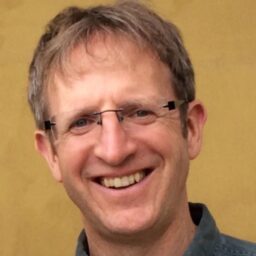
Forming the Fundamentals of Technology
Over the past 30 years, Hertz Fellow Storrs Hoen has led teams that created numerous inventions, from micro motors to the haptics for the Apple Watch.
Hoen graduated from Vanderbilt University with degrees in engineering and won a Hertz Fellowship in 1984. The flexibility of the fellowship allowed him to study physics and philosophy at Oxford University as a Rhodes Scholar before attending the University of California, Berkeley as a Hertz Fellow. He received his PhD in condensed matter physics from Berkeley in 1992.
After a postdoc with IBM Almaden, he joined Hewlett Packard and the subsequent spinoff Agilent. “At Agilent, I had the wonderful opportunity to create inventions from the earliest idea, convince people to join me, and build a team of 20 or 30.”
It was at Agilent that Hoen and his team created a micro motor. “This was so fun to create. It was something no one had ever thought of before,” he said. Hoen envisioned a wide range of potential uses for the micro motor, from running tiny mirrors for optical communications to powering miniature disk drives and atomic force microscopes.
“In none of those cases, for different reasons, did it actually become a product,” he said. “Though we tried—actually, several groups tried for about 10 years. It was still a marvelous part of my career to create something that was ten times better than the state of the art. You can’t necessarily control what becomes a product and what doesn’t.”
Hoen ultimately decided it was time to move on. “Fortunately, Agilent gave me the opportunity to hire very good people. One of the brightest, most capable people I hired eventually went to Apple,” he said.
Hoen’s former employee began recruiting him, and after the third big idea he was working on did not launch, Hoen joined him. “One of my key pieces of advice is to hire really, really good people so that later they can hire you,” he said, laughing.
At Apple, Hoen finally saw his ideas make it to market, including the current MacBook trackpad. “The trackpads in all the MacBooks now are electronic. I was part of the group that invented the key sensors and actuators to move the trackpad, so it feels like you are pressing a mechanical button,” he said.
His team also developed the part of the Apple Pencil that detects how hard you are pressing. “As you draw, your line quality changes, it becomes thicker or thinner, or lighter or darker, and really captures that sense of using a pencil,” he said.
The last major project he worked on at Apple was the development of the haptics in the Apple Watch and iPhone. “The tap that lets you know you’ve got a message on your watch, or that little click when you select something on your phone that says, yes, you’ve selected it—it’s more tactile, more fun to use, and it makes a significant difference to people,” he said.
“It was just an incredible gift, to form the fundamentals of the technology, and then throw myself into the factories in Asia with hundreds of engineers and technicians who are solving the thousands of problems necessary to create products on the scale of a hundred million per year, with each one bringing a bit of wonder.”
In addition to the joy of creating inventions and products, Hoen has enjoyed mentoring throughout his career. He has especially cultivated among his mentees a willingness to challenge the expectations of others. “There are many different paths that contribute to our society, and the one that your company is telling you to follow may not be the right one for you.”
It is a message reinforced by the Hertz community, Hoen said, albeit in a subliminal way. “When you’re talking with Hertz Fellows or attending Hertz events, there is this strong influence to do something useful, build something, invent something, or figure out something. As a student who was leaning towards engineering, it was wonderful to be in that milieu, to be surrounded by people who really valued engineering and valued having a positive effect on society.”
In turn, Hoen values the Hertz Foundation for its strong sense of community. “Hertz events are really exciting and at the same time nourishing—wow, I’m in this group who can see the issues critical to the world and invent inspiring fixes.”
The Hertz Fellowship “hugely” affected Hoen’s career, he said, by validating his interest in applied science and providing the freedom to work with the faculty member of his choice. To support the Hertz Foundation, Hoen and his wife, artist Beth Grossman, have been members of the Order of Magnitude, the foundation’s planned giving society, since 2018, and are committed to including the Hertz Foundation in their estate plans.
“There’s a marvelous saying that you die twice, first when your heart stops beating and second when someone mentions your name for the last time,” he said. “By including Hertz in our estate, we’re ensuring that a part of what is important to us lives on.”
